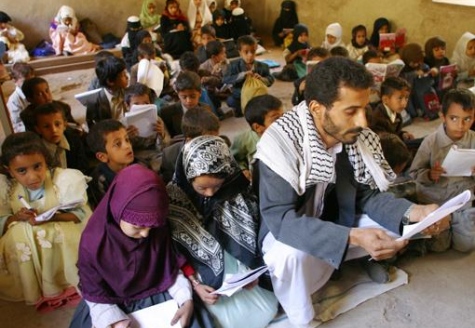Steven Chandler
Final Paper//Arab Spring
You can put most of the blame for the commencement of the “Arab Spring” uprisings on the lack of education and employment of the Arab World's youth. The demands and needs of poorly educated youth sparked multiple revolutions in a lot of middle eastern countries such as Yemen,Bahrain and Egypt. The role of education is and always will be vital in today's world of constant changes and advancement. Education in these places are available, but are they effective is the question, and is there opportunities after education. “However, what they fail to mention is that spending many years in school has failed to give many Arab youth a good education” (Anda Adams). 
“Education systems throughout the region are hindered by low quality, irrelevancy and inequity” (Rebecca Winthrop) To speak in general terms of the Arab world, schools and universities are turning out graduates, but these graduates lack basic skills needed to succeed in the workforce. Also the employment market is hindered by economic mismanagement, which leads to “high levels of education with mass unemployment”. (Kevin Watkins). These students are being taught by poorly trained teachers, and the curriculum is focused on educating the student to eventually work in the public sector, where jobs are slowly becoming extinct. The curriculum is also to get the students to pursue post-secondary education, which most of them them are not able to for a number of reasons
“The Arab world has the mother of all “youth bulges”. Nearly one in five people – around 85 million in total – are aged 15 to 24. Over half are less than 25” (Kevin Watkins). This age range is generally the people that are in school and are pursuing careers. The problem is, what’s being learned in school is pretty much irrelevant to what's needed to actually get a job. These countries are not creating enough jobs to handle all of the students post school completion and that’s a problem. This creates frustration within the youth of the middle east. Sounds kind of like America, spend all your life in school for a chance at a job, but in the Middle East it’s more severe. 
Education and Unemployment go hand and hand in these Middle Eastern countries. Yemen, one of the poorest nations in the world has a general unemployment rate of 50% and in youth it’s 73%. “Meanwhile, with the unemployment numbers at such alarming levels, the Yemeni government doesn’t seem to be doing enough to alleviate the problem” (Abdulrahman Shamlan) The messed up part is, a lot of these youth are educated, but there’s no jobs for them to pursue after school. It’s kind of like working towards nothing. A Yemeni youth named “Ali Radman” (bachelors in accounting) speaks on the issue of being a former student and not being able to find work in his field. “I’m still a burden on my parents five years after finishing my college studies,” he said. “I really hope things change soon, and I get a decent job and finally am able to pay them back while they are still alive.” Yemeni youth feel like they’ve let their parents down when they can’t pay them back for the education they helped pay for. It’s really nothing the youth can do though since there’s no jobs.
“Moreover, many Arab youth view their education systems not as a source of learning and opportunity, but as a vehicle through which autocratic rulers seek to limit critical thinking, undermine freedom of speech and reinforce their political control” In the middle eastern countries, teachers are poorly trained and teaching is looked at as low status and the last resort of employment. The curriculum is based on “rote learning” which is just a memorization technique and repetition. what's needed is problem solving skills to become more well rounded students. The teachers are generally not passionate about what they’re teaching they’re just in it for the money and that’s the wrong attitude for a teacher to have. 
“Even the most proactive applicant can't get a job that doesn't exist” (TheGuardian.com) In Egypt, just like most other countries job creation is needed. The education system needs to be reformed to teach the students what employers are looking for. “What we are trying to do, is to get these young people to understand a new [employment] culture, get the skills they need, and explore opportunities such as entrepreneurship to be able to compensate for the fact they can't find the white collar job that they want, with a tie, behind a desk," (Wahba). Finding different ways and avenues of employment since there are no jobs is a great tool to have.
The youth unemployment rate in Lebanon is a high 34%. “According to our findings, only 46 percent of the working age population participates in the labor market” (Haneen Sayeed).The government in Lebanon has created jobs, but the jobs that are being created are made for low productivity sectors for low skilled workers. You don’t need an education to get the job so whats the purpose of getting it? Many of the university graduated leave Lebanon to look for work. There’s generally low transition into formal jobs after education.
In conclusion, education and unemployment sparked what we know today as the Arab Spring. The middle east is a very youthful place with most of it’s residents being under the age of 25. Frustration,broken promises along with other things, is what sparks uprisings. People getting educated thinking that there life will improve and find out the hard way that there isn't even jobs for them to get. The only thing to do about is change by expressing the frustrating. The only way to get attention is to protest and be heard.
"The Role of Education in the Arab World Revolutions." The Brookings Institution. N.p., n.d. Web. 17 Apr. 2014.
"Education Failures Fan the Flames in the Arab World." World Education Blog. N.p., n.d. Web. 17 Apr. 2014.
"Bahrain's Education System." Washington Cultural Office Cultural Division Staff. N.p., n.d. Web. 17 Apr. 2014.
"The Desperate Reality of Yemeni Youths and Unemployment." National Yemen Newspaper. N.p., n.d. Web. 17 Apr. 2014.
Provost, Claire. "Egypt: Tackling Youth Unemployment." Theguardian.com. Guardian News and Media, 03 Aug. 2011. Web. 17 Apr. 2014.
No comments:
Post a Comment